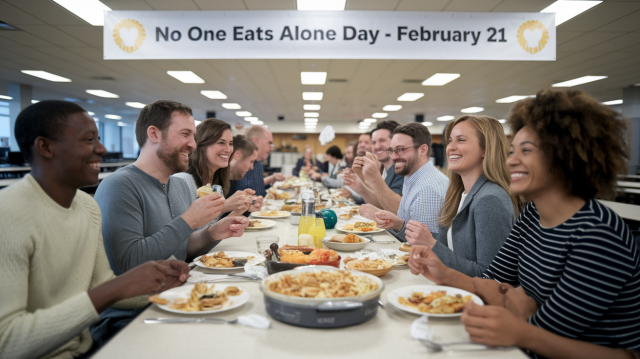No One Eats Alone Day, observed annually on the third Friday of February, falls on February 21, 2025. This day is dedicated to fostering inclusion and combating social isolation, particularly among students in schools. Created in 2012 by the nonprofit organization Beyond Differences, the initiative encourages students to sit with peers they may not know during lunch and build connections, ensuring no one feels left out or excluded.
Why Is It Celebrated?
No One Eats Alone Day is celebrated to address the growing issue of social isolation, which can have profound effects on mental health and well-being. The day promotes inclusivity, kindness, and belonging by encouraging individuals to reach out to those who may feel isolated. It serves as a reminder that small acts of connection can make a significant difference in creating a supportive and welcoming environment.
Cultural Significance
The day reflects values of empathy and togetherness, transcending cultural and social boundaries. By encouraging students to break down barriers of race, ethnicity, and social status, No One Eats Alone Day fosters a culture of acceptance and respect. It highlights the importance of shared experiences in building stronger communities.
Social Impact
No One Eats Alone Day has a significant social impact by promoting peer-to-peer connections that help reduce feelings of loneliness and exclusion. Schools across the U.S. participate in activities designed to create a sense of belonging among students. The initiative also raises awareness about the mental health risks associated with social isolation, inspiring broader efforts to cultivate inclusive environments.
The Importance of It
This day emphasizes the importance of inclusion as a foundation for healthy relationships and community building. By encouraging students to engage with peers outside their usual social circles, it helps combat bullying, discrimination, and other behaviors that contribute to isolation. The initiative also underscores the role of schools in fostering positive social interactions.
Educational Value
No One Eats Alone Day educates students about the effects of social isolation and teaches them skills for building meaningful connections. Participating schools often incorporate lesson plans and activities that encourage empathy, communication, and teamwork. These lessons extend beyond the classroom, equipping students with tools to create inclusive spaces in their communities.
Emotional Connection
For many participants, the day fosters emotional bonds by creating opportunities for genuine interaction and friendship. Students who might otherwise feel invisible or excluded experience a sense of validation and belonging. Stories of newfound friendships formed on this day highlight its transformative power.
The Origin of It
No One Eats Alone Day was founded by Beyond Differences in memory of Lili Rachel Smith, a teenager who experienced social isolation due to Apert Syndrome before passing away at age 15. Inspired by her story, her family created Beyond Differences to combat social isolation in schools. The first observance took place in Northern California schools in 2012, eventually expanding nationwide.
Historical Events
- 2009: Lili Rachel Smith passes away after experiencing social isolation.
- 2012: The inaugural No One Eats Alone Day is observed in Northern California schools.
- 2018: Over one million students across 2,300 schools participate in the event.
- 2024: Beyond Differences merges with Sandy Hook Promise to expand its reach and impact.
Evolution Over Time
Initially focused on middle schools in California, No One Eats Alone Day has grown into a national movement celebrated in thousands of schools across all 50 states. Modern observances include interactive activities like conversation starters, art projects, and leadership programs aimed at fostering inclusion.
How to Celebrate
- Invite Someone New: Encourage students or colleagues to sit with someone they don’t usually interact with during lunch.
- Organize Activities: Host events like icebreakers or group discussions that promote connection.
- Participate in School Programs: Schools can use resources like Beyond Differences’ Belonging Box to implement structured activities.
- Share Online: Use hashtags like #NoOneEatsAloneDay to spread awareness on social media.
- Volunteer or Donate: Support organizations working to end social isolation through donations or community involvement.
Conclusion
No One Eats Alone Day is a powerful reminder of the importance of inclusion and kindness in combating social isolation. By encouraging meaningful connections, this day inspires individuals to create environments where everyone feels valued and supported. Let’s honor this occasion by taking action—whether through small gestures or organized efforts—to ensure no one eats alone.











